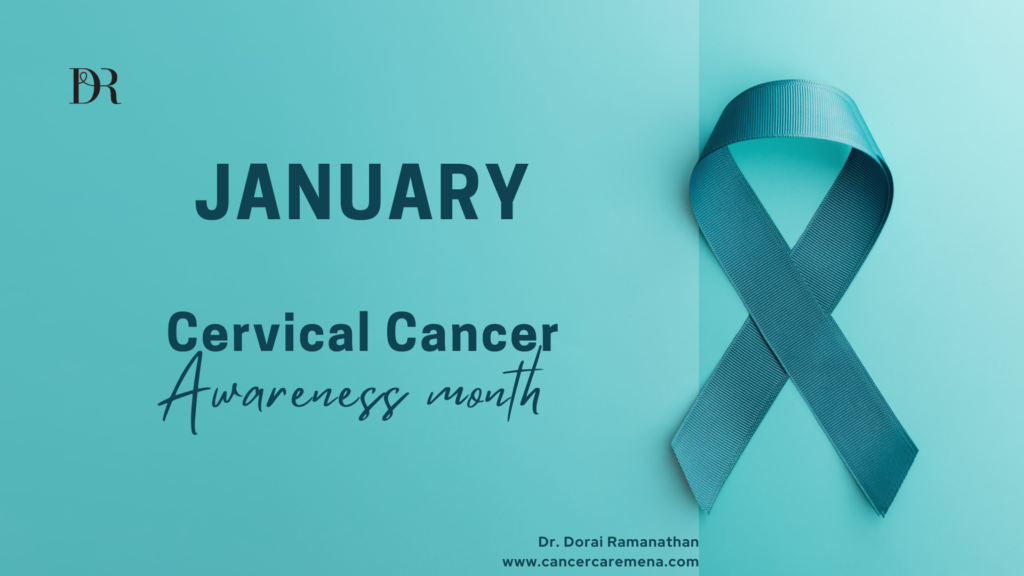
January is cervical cancer awareness month, which is a call for people to spread information about this disease which is preventable yet lethal to many women. That is why at Cancer Care MENA we strive to raise awareness and educate women in the region as to the symptoms of the disease, the importance of early detection and treatment, and ways that they themselves can take to prevent it and if diagnosed in its early stages to fight it.
It is perhaps timely to know what cervical cancer is, why there cannot be enough fuss made about it, and what can be done to prevent this terrible disease from claiming more lives, of the women that we hold dear.
What is Cervical Cancer?
Cervical cancer affects cells which are specially located in the cervix, this is a lower end part of the uterus that is in connection with the vagina. In most of the cases, cervical cancer is attributable to infection with high-risk cervical human papillomavirus – a sexually transmitted infection.
Cervical cancer is in most of the time asymptomatic and-develops slowly, thus, if not detected, it results in serious consequences. That is why awareness and early screening are important when it comes to this disease type.
Why Cervical Awareness is Important.
In the world cervical cancer is ranked fourth most common form of cancer that affects women. It remains one of the most common types of cancer across the globe, however, it remains one of the most preventable and curable due to recent improvement in its detection methods and eradication through the HPV vaccine.
While breast cancer screening is highly encouraged for early detection, most women do not have any idea of this or else do not have know how to access a healthcare provider for this purpose. That is why cervical cancer awareness month seeks to fill this gap by making communities more aware and taking appropriate steps to avoid this disease.
How to Prevent Cervical Cancer: Steps Every Woman Should Know
1.Having Regular Pap Smears and HPV Tests
However, common cervical screening must be conducted in order to detect the precancerous before turning into cancers. A Pap smear diagnoses cervical dysplasia while the HPV screens for the virus responsible for most cervical cancers. Screening for cervical cancer in women should begin at twenty one years or when recommended by a health care practitioner.
- Consider the HPV Vaccine.
HPV vaccine is highly protective of the HPV strains that are most likely to cause the development of a cancer. They always say that it is prescribed and works at the age of 9 to 14 years, but there is another plus for youthful people up to 45 years.
- Practice Safe Sexual Health.
The best way to prevent HPV is to practice safe intercourse and use protection as well as not to have multiple sexual encounters.
- Adopt a Healthy Lifestyle.
A good immune system is very essential in combating HPV infections. Be aware of diet as well as exercises, and quit smoking, because smoking contributes to cervical cancer.
- Educate Yourself and Spread Awareness.
Education on the signs and causes of cervical cancer should be the next thing in line. Remind and educate your family, friends specially sisters, mothers and daughters to take care of themselves and go for regular checkups to avoid any future complications.
Early detection of the symptoms of Cervical Cancer.
Cervical cancer is present or developing. In the initial stages, cervical cancer may not show any sign definitely, warning signs. However, as the disease progresses, the following signs may appear:
Abnormalities of vaginal discharge (e.g., breakthrough bleeding, postcoital bleeding or in postmenopausal women).
Dyspareunia or experienced by women as deep abdominal or lower back pain.
The presence of bad odour from the vagina.
Pain during intercourse.
Do seek medical advice if you have any of the following symptoms: When it comes to diseases it’s good to note that early diagnosis is the key to overcoming these diseases.
Fight Cervical Cancer, Be Part of the Solution
Cervical Cancer Awareness Month is the reminder that people, families, and communities should respond to fight for the disease’s treatment and support the women who suffer from it. At Cancer Care MENA we endeavour to ensure that patients have access to the relevant knowledge that would help in early detection and treatment.
How You Can Help
- Schedule Your Screening : GI laboratory is important in checkups for early diagnosis.
- Talk About It : Getting rid of embarrassment being associated with cervical cancer can lead others into taking their health seriously.
- Support Awareness Campaigns : Educational material should be shared, local meetings can be visited or else the interested person can offer their services for a certain cause.
Conclusion
All credit goes to the fact that cervical cancer is a preventable disease and if diagnosed early is one of the easiest cancers to manage. It also proves that by raising awareness, practicing prevention and encouraging more research, we can in deed come close to the day when no woman perishes from this dreaded disease.
Every month let it be one of action, knowledge, and women empowering themselves. To learn more or schedule a consultation, visit [Cancer Care MENA](https://cancercaremena.com/). Together we can forge a new healthier tomorrow for all of us.
Safeguard your well-being now—because the first line of defense is education.



